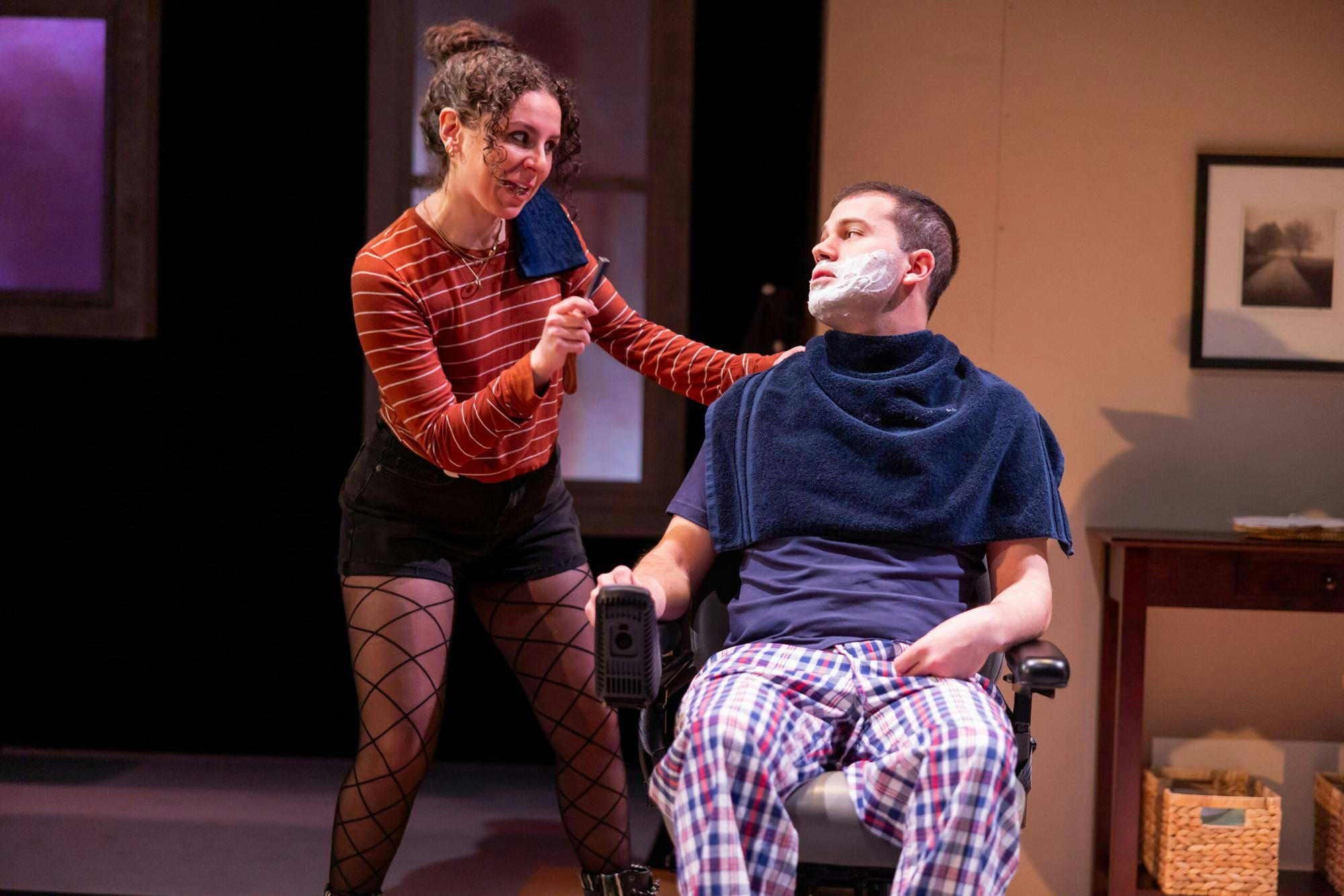Running March 8–30, SpeakEasy Stage Company brings Martyna Majok’s “Cost of Living” to Boston audiences. Winner of the 2018 Pulitzer Prize for Drama, Martyna Majok’s play speaks to the fragility of life by interweaving the lives of four individuals, each one hardship — emotional, financial or physical — away from ruin.
Running 1 hour and 40 minutes with no intermission, “Cost of Living” is a beautifully paced show. Moments of tenderness and intimacy punctuate the daily, private experiences of people with disabilities and those who care for them. Between these moments, Majok develops her characters. As she explains in the script notes, “self-pity has little currency. … Humor, however, has much.”
Lewis D. Wheeler’s opening monologue introduces Eddie, an unemployed truck driver who is eloquent and authentic as he laments the loss of his estranged wife, Ani (Stephanie Gould). The timeline of the show then skips back a few months to tell the story of the couple’s relationship following an accident that results in Ani’s paralysis. Gould’s Ani is both raw and real, with a biting wit that reveals the depth of the character’s hurt as she processes the changes in her abilities and relationship with Eddie. From the top of the show, Wheeler delivers an honest performance as he expresses Eddie’s grief, guilt and growth.
Meanwhile, John (Sean Leviashvili), a Princeton University Ph.D. student with cerebral palsy, is living on his own and seeking a private caretaker. Jess (Gina Fonseca) is a first-generation Princeton graduate holding down several jobs, including multiple bartending gigs, who now is John’s caretaker.
This pair’s story is about judgment of physical ability, prestige and attractiveness. Through their relationship, audiences view the intimacy and humanity required to be a caregiver and how this is at odds with Jess’s initially hesitant and guarded approach to the job.
This narrative weaves class struggle throughout: John’s status as independently wealthy affords him the freedom to live on his own and hire an aide outside of an agency, while Jess is separated from her mother, who left the U.S. to receive more affordable healthcare, and works to send money back to her.
Director Alex Lonati masterfully navigates the ebb and flow of developing trust between lonely souls facing the precarity of life. These two plot lines occur in parallel, each slowly revealing the lives of the characters on their respective halves of the stage. Walking the full length of the stage during a scene of stunning snowfall and isolation, Jess bridges these stories before the final scene plays out center stage.
As these characters’ stories converge, so does the play’s timeline. Eddie’s opening monologue precedes a flashback in time. The play then flows chronologically, leading up to the final scene, which occurs immediately after this monologue. However, the initial leap back in time was unclear and left some primed to question Eddie’s intentions and transparency with his separated wife. Once the timeline resolves in the final scene, questions of when Eddie and his wife separated, when the accident occurred and when his wife finally left him are answered.
Like herself, Majok’s characters have “lived a lot of life.” Majok’s own story shares experiences with Jess, having balanced bartending jobs with caretaking two disabled men. From this season of labor paired with the grief of losing her grandfather, Majok wrote Eddie’s opening monologue.
Despite the play’s critical acclaim, it has a reputation of being difficult to produce for its stipulation of casting disabled actors in the roles of Ani and John. Actors Gould and Leviashvili both live with cerebral palsy. Gould, whose credits include roles on “Orange is the New Black” and several off-Broadway productions, shared with the Boston Globe that her mentor stressed that her disability “would become ‘an asset’ one day.”
Brennan Srisirikul, consultant and community liaison for SpeakEasy Stage’s production, expounds upon the connection between disability and theatre, explaining that because “disabled people and our stories are oozing with possibility and creativity,” theater opens an imaginative and ingenious space for this possibility to flourish.
“Cost of Living” runs through March 30 in Boston’s South End, with student rush tickets available for $15 and general admission tickets starting at $25.






